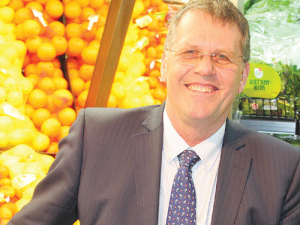HortNZ levy vote looming
Commercial fruit and vegetable growers are being urged to their say in the upcoming levy referendum to enable Horticulture New Zealand (HortNZ) to continue its work for the sector.
 Former Hort NZ chair Julian Raine says the extra workers will be the difference between harvesting full of half crops.
Former Hort NZ chair Julian Raine says the extra workers will be the difference between harvesting full of half crops.
Nelson grower Julian Raine says the Government's decision to allow seasonal workers from some Pacific nations, without going through the standard two-week managed isolation, is a great move.
Raine says extra workers from Samoa, Tonga and Vanuatu will boost fruit harvesting.
"While the Government hasn't said how many workers will be allowed into the country from September, the extra workers will be the difference between harvesting full or half crop for us," he told Rural News.
"It's great to see the NZ Government rethink on seasonal workers from Samoa, Tonga and Vanuatu. It's a huge relief for our permanent staff, service suppliers and customers."
Raine, a former Horticulture NZ chair, grows apples and kiwifruit. He has 50 full-time staff and hires 126 Pacific Island workers under the recognised seasonal employer (RSE) scheme to help harvest 40,000 bins of fruit.
Last year, he had only two-thirds of his RSE workers due to Covid restrictions. As a result, some apples couldn't be harvested.
Last week, Prime Minister Jacinda Ardern announced that there would be a one-way corridor, entering New Zealand only, and the RSE workers would not need to go through the standard two-week managed isolation.
The move aims to address worker shortages in certain agricultural areas, she said.
Like the 2000 RSE workers brought in last year, the same conditions - including paying at least the living wage and providing appropriate accommodation would be enforced.
There are normally about 14,400 RSE workers a year, but the pandemic and border restrictions have cut that workforce in half.
However, it is not known exactly how many workers would be able to enter the country from September.
HortNZ chief executive Nadine Tunley says without the support of this seasonal Pacific workforce, permanent jobs held by Kiwis and the growth of New Zealand's horticulture and wine industries are at risk.
"While Kiwis will continue to be first priority for employment in our horticulture and wine industries, we still require additional help from our seasonal workforce, particularly during such challenging economic times," says Tunley.
Industry bodies are working with government to finalise details and ensure that the health, safety, and wellbeing of workers remain paramount throughout this transition.
South Waikato farm manager Ben Purua’s amazing transformation from gang life to milking cows was rewarded with the Ahuwhenua Young Maori Farmer award last night.
Bankers have been making record profits in the last few years, but those aren’t the only records they’ve been breaking, says Federated Farmers vice president Richard McIntyre.
The 2023-24 season has been a roller coaster ride for Waikato dairy farmers, according to Federated Farmers dairy section chair, Mathew Zonderop.
Ministry for Primary Industries (MPI) director general Ray Smith says job cuts announced this morning will not impact the way the Ministry is organised or merge business units.
Scales Corporation is acquiring a number of orchard assets from Bostock Group.
Family and solidarity shone through at the 75 years of Ferdon sale in Otorohanga last month.

OPINION: This old mutt well remembers the wailing, whining and gnashing of teeth by former West Coast MP and Labour…
OPINION: Your canine crusader gets a little fed up with the some in media, union hacks, opposition politicians and hard-core…